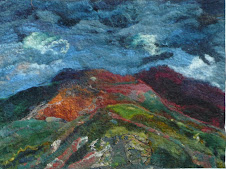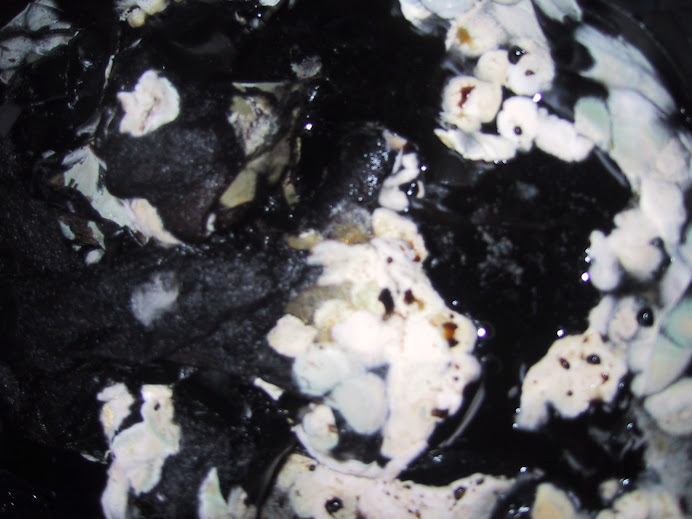 Posted by Helen
Posted by HelenPhoto shows the Baptisia Australis propped up by the pole. Hanging over the top is the flowering head of Persicaria Tinctoria -note the sun putting in a rare appearance!
Today while picking rhubarb leaves in Enys garden I mentioned I was going to see whether there was any indigotin in my Baptisia Australis of which I have one in a pot outside my sitting room window, at which Enys promptly dived into her jungle and heaved out a great bunch of it. Weighed it proved to be 150g with stalks.
When I got back I went to check the details in Dye Plants and Dyeing by Margaret and John Cannon (published by The Herbert Press Limited in association with the Royal Botanic Gardens Kew) one of my "bibles" of dyeing and realised I had made a stupid mistake. It is Baptisia Tinctoria which is repute to contain indigotin, the Australis is said to give a green with the leaves. I checked with Enys who said it was definitely the Australis we both had as she can't get hold of the Tinctoria .
So I chopped up the leaves and stalks and put them, covered with water, in a pot to dye, which now means my last available heat source in the studio is in use. The two hot plates are fermenting madder and indigo. In the slow cookers are weld, golden rod, madder and now Baptisia Australis. One electric ring has a bath from Lythrum Salicaria which dyed a brown yesterday. I have just added 1 teaspoon of iron to and to my delight it looks as if it going to go black, previously I have only got a grey from purple loostrife. On the other electric ring is the 1.2 kilo of rhubarb leaves being gently heated to produce oxalic acid and the final pot contains 400g of 18.5 micron merino being mordanted in preparation for a big dyeing session ready for Felt Stoles at Burton Manor. And I am going to have a glass of wine!






















I've just got the one ring in my 'dye studio' - it takes forever to heat one large dyebath and when there's washing, mordanting and dyeing to do it takes two days just to process one small batch of yarn.
ReplyDeleteI can see from your example that I definitely need to invest in more rings!
Hi Sue I do recommend the slow cookers but make sure you get one with a keep warm facility, which keeps it at 90 degrees. These modern ones are really electric casseroles. I have now found that there are 6.5 litres which is quite big and will do about 250g of wool. Depends on what you want to dye and how bulky it is too.
ReplyDeleteHelen, in my inner eye you're surrounded by steaming pots and pans, stirring here and lifting out fibres there:)) sometimes I feel hampered just having the cooker in the kitchen - but in this weather there's just no way to dye outside with a gas cooker:( I did have one plant of b. tinctoria for 3 or 4 years, but it didn't like it here either (I think I am doomed with most indigo bearing plants:().... you do get the seeds from www.horizonherbs.com - unfortunately in oregon, but you can order seeds quite easily. they also have interesting herbs and other dye plants! Richo Cech and his family sell extremely viable seeds, I have ordered from them several times and only one plant didn't germinate, but that was a notoriously difficult one! they also have the proper alkanna seeds and Zi-Cao, the japanese gromwell with roots, that dye purple (grows well here, but I didn't dig up the roots yet!)
ReplyDeleteGuess you are up to your second glass meanwhile. I'm only here to let you know how much i enjoy your blog. Have a nice weekend.
ReplyDeleteHi Bettina I am sure I would have been burnt as a witch in days gone by as I have so many steaming cauldrons! Your minds eye is quite right except you need to add in quite a bit of chaos!
ReplyDeleteHi Martinee Thanks for telling me you enjoy my blog - I am always quite astonished when people tell me that so thank you and yes I enjoyed the second glass too!
And what color is that wine going to give...lol...sounds like a dyeing party ..I have an outside propane cooker and it works really well...way better than the hot plate Iused to have. good posting
ReplyDelete